“We have finally come up with your ultimate challenge.” Philippe’s laconic French Swiss accented voice, which always held the undertone of an unbridled sense of humour, drifted over the phone. “This is not just a simple task like conquering Kilimanjaro or anticipating the exact timing of the wildebeest migration in Serengeti or finding Bushmen in the Kalahari or any of the other hurdles that we have thrown your way. This is the acid test of your ability as a guide. We want to go to new places in Zambia, as well as your camp in the Okavango, in search of aardvarks and pangolins.”
Philippe, a medical doctor, is part of a small group of friends who have shared at least a dozen safaris with me over thirty years, during which we have visited many of the remotest wildlife areas in Africa. Rolf, Tony and Juerg were to join Philippe to form the team for this latest adventure. This time they had raised the bar virtually to the point of mission impossible. Pangolins and aardvark are some of the most rarely encountered mammals in Africa. In four decades of guiding, I have not seen either of these animals more times than I have fingers on one hand. To attempt to discover both in a three-week safari was about as likely as finding a mating pair of snow leopards in the Sahara. To compound the challenge, the only time of the year that Rolf could make the trip was October – ‘suicide month’ in these parts, due to its oppressive heat and ahead of the tropical rains which cause termites to start extending the exterior of their mounds thus offering themselves as food to both our targeted species. Pangolins are fussy eaters, only eating selected ant and termite species, while aardvarks, who also prefer ants and termites when they are plentiful, will resort to other insects and even fruit when termites are inactive. In October termites are inactive. As should every living thing be, if you ask me.
Once I had accepted the gauntlet I panicked. I needed as much help as I could get, even if it involved ‘cheating’. At an expense that you would expect when laying down a deposit on a Ferrari, I ordered a state-of-the-art thermal imaging, night-vision monocular, which the sellers would only hand over once I had promised not to use it to start a nuclear war.
The looks of relief on my friends’ faces were palpable when I met them at the Kenneth Kaunda International Airport in Lusaka. After all I held all the vouchers, knew the itinerary and had the nuclear device in my rucksack. We took the scheduled flight from Lusaka to Mfuwe in eastern Zambia near the South Luangwa National Park and then a drive in the dark to our lodge, Tafika. Our rooms, which were large and extremely comfortable, were made stylishly from materials sourced locally. The walls, which are made from grass, are rebuilt annually after the rains. The guys were all ready for bed after their long international flights, so we retired after supper and planned an early morning game drive. I gratefully crawled into bed under a cleverly designed mosquito net that folded out and was not obvious during the daylight hours and was soon dead to the world. It didn’t last long. I was stirred from a deep sleep by the sound of a large hippo munching on my head. As I surfaced from my world of dreams, I realised that it wasn’t actually chewing on my skull but it was not far from it. It was so close that I could smell its musky breath. The sound of its slobbery mouth was almost deafening in the still of the night. The only thing that separated us, I realised with a start, was a layer of grass and I was uncomfortably aware that grass forms a major part of a hippo’s diet. He wasn’t as interested in the grass wall, however, as I discovered in the morning, as he was in a pile of sausage tree flowers that had been raked into a pile and considerately positioned outside the chalet right near where my head would be once it hit the pillow. He was so thoroughly appreciative of the gardener’s work that he munched his way through the night, rendering sleep impossible. He was still there when I dozily left on the game drive.
We soon fell into the lodge routine. Coffee and a quick but varied breakfast, early morning game drive with coffee and delicious homemade biscuits, an expansive spread for brunch, siesta, afternoon tea with cake and pastries, a game drive with sundowner and snacks, night drive back to camp followed by a three-course dinner. On the off chance that we were still peckish there was a large jar of those freshly baked biscuits in the room. Believe me it is a lifestyle to which one can quickly become accustomed but, after a month of this indulgence, expect to need help getting into the vehicle.
Tafika is situated on the Luangwa River on a small conservancy adjacent to the National Park, so we passed through an official entrance gate and were restricted as to how late we were permitted to be in the park at night. The highlight of that first evening was undoubtedly following a successful wild dog hunt and watching the frantic interaction as hyenas attempted to steal their kill. Philippe, whose colossal camera could be mistaken for a rocket launcher, caught the first of many world class photographs that he took on this three-week adventure. While in South Luangwa, we were rewarded with well over twenty species of mammals – including a leopard and five other nocturnal critters – and each of us gained a couple of pounds in weight, but we did not have a realistic opportunity to search for our target species.
The next camp that we were going to might be different, I thought. We would have an entire National Park to ourselves with no restrictions on night drives. Luambe, a comparatively small park upstream from South Luangwa, only had one camp, in which we would be the sole guests. It was a delight. Alec Cole, our guide, went out of his way to indulge our unusual requests, including an all-night drive which resulted in the sighting of a serval which had not been recorded before – either by the researchers who were based there or any of the camp staff. The Luangwa has the highest density of hippos anywhere. It’s almost impossible to look at a stretch of the river without seeing a hippo – or a vast float of them – and Luambe camp seems to have more of these beasts than in any other part of this river. In fact, the largest float that I have ever encountered – three hundred or so of these massive beasts – bob about in a deep pool close to the lodge so we spent an entire afternoon photographing them squabbling and snorting and blowing water high into the air, before we ventured out looking for the creatures of the night.
As we left the hippos, we noticed that one of them had died and a couple of crocodiles were battling to open its thick skin. We decided to return at the end of our game drive to check on progress and when we did our spotlights lit up a scene that would have made Dante shiver. Reflected eyes from hundreds of prehistoric reptilians lit up the waters like stars in the sky. They had massed to partake in the feast. I am not sure about Dante, but I certainly shivered when I recalled that we had waded across this same river that morning not far upstream, to perch on stools in the shallows close to the deep flowing channel, casually drinking coffee and eating biscuits, while watching carmine bee-eaters cavorting around the nests they had dug into a riverbank. I wondered how many eyes had been watching us, plotting our demise should we have moved just a tad closer to the deeper water.
That we failed in our mission to find aardvarks, I believe, is largely due to the terrain. Much of the park is submerged during the heavy rains and aardvark live in dens which would be flooded. They would therefore move from the plains onto the more heavily vegetated islands which were inaccessible by vehicle. Also, their food sources would not thrive in seasonally flooded areas – so we moved onto North Luangwa by plane without having achieved either of our goals.
We spent a couple of nights at Takwela Camp, an intimate tented camp, and again we were the only people in residence. Our sightings included honey badgers, bushytailed mongooses (a first for me), civets and genets but there was another form of game that was my goal that night. The Springboks were playing the All Blacks in the 2024 Rugby World Cup final. The German speakers, who clearly had a deprived childhood devoid of rugby, retired early but Philippe, who had spent a part of his youth in France where he learned to love the game, as well as our pilot who was also from Botswana and I toggled between our mobiles to watch the match and tried to keep up with the score. Two friends had been coerced into sending regular updates, and thus the three of us followed the game, huddled around a table, while an inquisitive elephant came up close to investigate what we were up to. The Springboks retained their title by a single point and our pilot remonstrated when we poured him a large celebratory scotch, after which we wobbled off to bed very happy indeed, thank you!
A series of flights saw us swoop across Zambia from east to west and land up in Kafue National Park where we were to stay at Nanzhila Lake Camp, in a new lodge which belongs to friends of mine – Steve and Cindy Smith, on the edge of Lake Itezhi-tezhi. My guys had met them on a previous trip at our next destination, Nanzhila Plains Camp, so it was like a homecoming reunion. We arrived in time for a welcome lunch – we hadn’t eaten since breakfast after all – and an afternoon game drive. But the pressure was on: Luangwa had failed to deliver either of the critters that we wanted.
The game drives along the floodplains of the lake were marvellously productive and scenic but for me the exciting thing was that our camp guide had found an active aardvark burrow, to which he proudly took us. The tracks at the entrance to the burrow were fresh – and tell-tale flies, indicators that the aardvark is in residence, were buzzing around the entrance. We determined to return with a camera trap and the night-vision monocular at dusk. We positioned ourselves carefully at an unintimidating distance and waited in silence for two hours before the first rustling sounds of movement came from the burrow. Through my night instrument I could see clumps of sand being thrown towards the entrance from deeper inside the burrow, then a black silhouette of a head and long ears poked into the open. I frantically tried to hit the record button but in the dark I couldn’t get the sequence right. Then the camera trap clicked right near the aardvark and it bolted, well – like a startled aardvark from a burrow – and into the bush. I had no idea just how incredibly speedy these long snouted pig-like creatures can dash in a zig-zag manner. I concede that it was not the best of all possible sightings, but we rightfully celebrated that we had seen an elusive aardvark, however fleetingly.
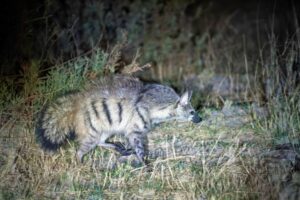
The next day the consensus was that we had seen the aardvark and that another two taxing hours of immobility was not for us, so we set the camera trap at a less intrusive distance and secured photos of our new friend, taken while we enjoyed sundowners and snacks on an agreeable game drive.
Our old haunt, Nanzhila Plains Camp, offered up some magnificent lions, fantastic photographic opportunities of a Sharpe’s Grysbok – a rare sighting in Botswana, hence my enthusiasm – and its usual exceptional selection of nocturnal animals. We also experienced the compulsory vehicle breakdown when the front wheel literally fell off in a decisively irreparable manner. There was no mobile signal where we were stranded, but our guide assured us that we would get signal in an open area about an hour’s walk away. Leaving Philippe and Tony at the vehicle, the rest of us set off on foot. We could not raise a signal when we reached the open plain, so the guide climbed high into a tree with a phone and finally made contact with Lake Camp as Plains Camp only had intermittent signal under one tree just outside its limits. It was so sporadic that Steve would leave his phone in the tree and check for messages from time to time. My, will Starlink revolutionise his world!
By the time our stay in Zambia ended, we had accumulated a truly impressive list of mammal species, but still no pangolin, as we headed by vehicle to the Chobe in Botswana. We stayed at my camp, Chobe Forest Camp, and I catered – so everyone lost a bit of weight, even though their day was slothfully filled with sitting in a comfortable hide, sipping iced drinks and watching the parade of animals, led by elephants, coming to the waterhole to drink.
As we didn’t have a pangolin come to the waterhole to drink – truthfully, they never need to drink; termites are apparently juicy enough for them – and we didn’t spot them on the night drive or from the boat on the Chobe river, we moved on to the Okavango Delta, where we stayed in a private camp and my good friend and excellent Bushman guide, Dicks, guided us in one of the top game areas in the Okavango. In the four nights that we were there pushing the nocturnal hours, we found an aardwolf, porcupines, civet, honey badger, leopards, wild dogs and filmed buffalo hunting lions. Just in case you are not paying attention, we initially watched a pride of five lionesses trying to hunt a buffalo herd that quickly turned the tables on the cats and chased them into thickets and up termite mounds where they surrounded them threateningly. The lions managed to escape by an undignified, rapid retreat.
Yet, despite all the success – we saw a personal best record of 55 mammal species – we did not find a pangolin. That challenge lies in the future…. Did the guys regard this safari as a failure? Far from it. They all stated that it was arguably the best of all the trips that we had done together.
Philippe compiled the most wonderful coffee table book of our safari, filled with professional quality photographs. He and the guys graciously sent me a copy of this exceptional keepsake. I am considering making this compulsory for all my future guests.

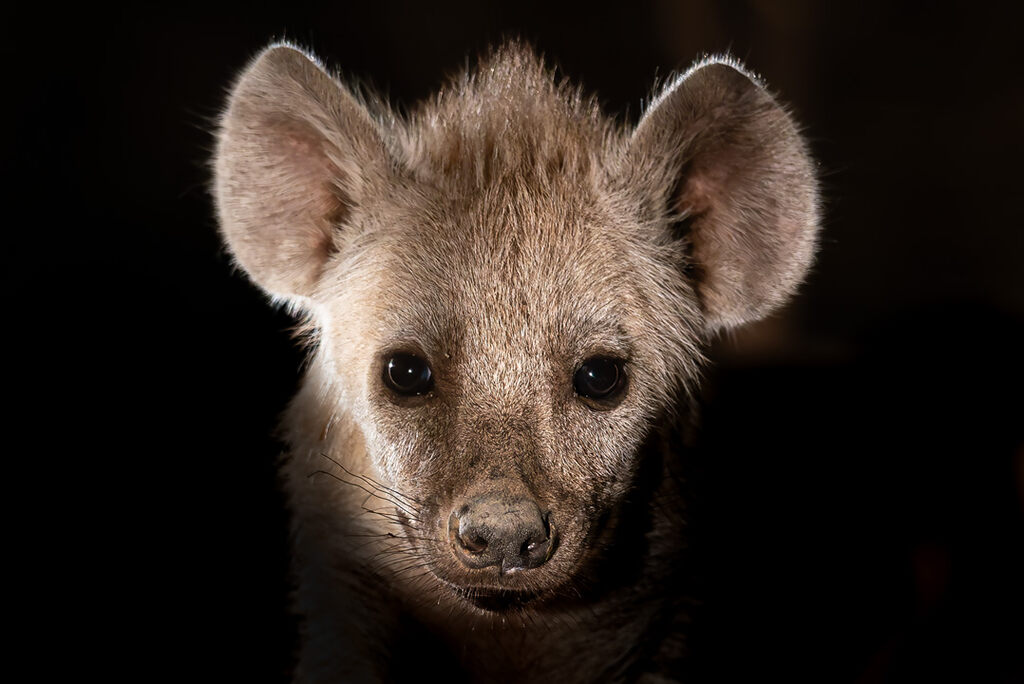
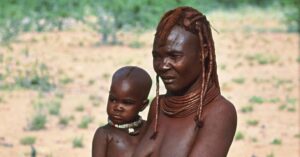
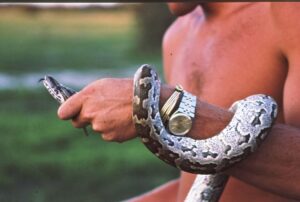
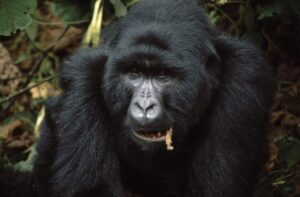
My name is Philippe Kress, the guy mentioned above! This was one of our best if not our best lifetime trip ever. Having passed the age of 60 and travelled the world to virtually all remote places (ranging from horse riding through Easter Island to trekking through Papua New Guinea and back and around the globe) and all being experienced backpackers, please take the following as coming from a competent source: all of us enjoyed exceptional thrills and phenomenal sightings. Only possible with the best guide and the best crews, all melted together for this absolutely unique experience!!!